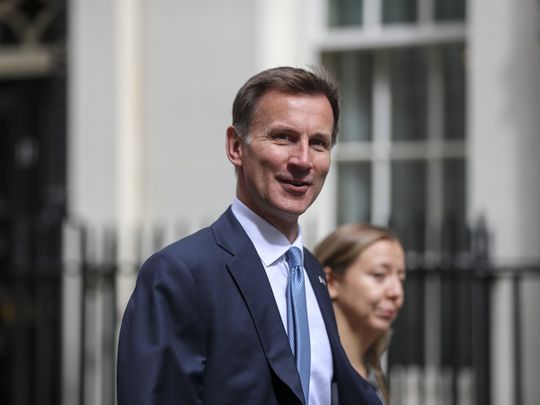
London: UK government bonds and the pound extended a surge as the nation’s chancellor laid out plans to abandon vast portions of the expansive fiscal stimulus that had plunged the market into turmoil.
The yield on 30-year gilts fell as much as 44 basis points to 4.34 per cent, the second biggest drop on record on a closing basis. The pound rose as much as 1.4 per cent to $1.1331, outperforming other Group-of-10 peers.
Newly-appointed Chancellor of the Exchequer Jeremy Hunt scrapped a number of tax-cut proposals and signaled consumers would shoulder more of the increase in energy prices from next April in a statement Monday.
“Gilt yields have signaled something of a thumbs up so far,” said Peter Goves, fixed income research analyst of MFS Investment Management. “The reversal of much of the unfunded tax cuts is welcome and is a stepping stone towards restoring fiscal credibility.”
The overhaul adds to a series of U-turns by Prime Minister Liz Truss after her initial mini-budget proposals sent markets into tailspin. The government faces additional pressure to restore investor confidence in public finances now that the Bank of England’s emergency bond-buying operations - a backstop to the market - have ended.
Traders also pared bets on BOE rate hikes, as a reduced stimulus package takes the pressure off the central bank to tighten more aggressively.
Money market wagers show the rate peaking at around 5.25 per cent in 2023, the lowest level since the announcement of the mini-budget on September 23. Two-year bond yields, among the most sensitive to interest rates, dropped as much as 41 basis points to 3.51 per cent. The yield on 10-year inflation-linked bonds also fell as much as 62 basis points to 0.33 per cent.
Markets now turn their focus to Hunt’s address to lawmakers later Monday, as well as the full medium-term fiscal plan due at the end of the month, which will be accompanied by forecasts from the UK fiscal watchdog.
Another key question for investors is whether the BOE will go ahead with the planned active sales of gilts it accumulated under quantitative easing, which have already been postponed to October 31 due to turbulent trading conditions.
It “feels like they are leaning towards ploughing ahead with programs as planned right now, but a lot will depend on market conditions between now and 31 October,” said Imogen Bachra, rates strategist at NatWest Markets.
The central bank said it intends to resume sales of corporate bonds in the week beginning October 24 in a statement Monday.
The BOE also confirmed the end of its bond-buying operations on Monday, and highlighted that its temporary expanded collateral repo facility - aimed at enabling banks to help ease liquidity pressures on liability-driven investment funds - would remain available until November 10.
It is still unclear to what extent LDI funds, which exacerbated the bond market sell-off after facing collateral calls, have been able to build up buffers to protect against further spikes in gilt yields. That could render them vulnerable if market sentiment swings the other way.
“For the time being, it looks like this is enough to restore credibility. We’ve seen that the gilt market is in better shape,” said Geoff Yu, a strategist at BNY Mellon. “The BOE should feel comfortable for having ended its bond-buying.”












